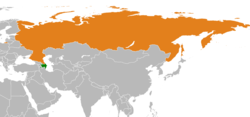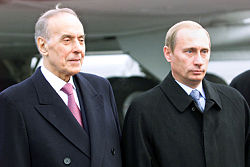Diplomatic crisis
An Azerbaijan Airlines Embraer 190 jet, Azerbaijan Airlines Flight 8243, crashed near Aktau, Kazakhstan, on 25 December 2024, killing 38 of 67 on board. The plane veered off course before crashing, but Aviation-security firm Osprey Flight Solutions suggested the aircraft was likely struck by a Russian air-defense system amid heightened tensions following drone strikes in southern Russia, though Russia cited a bird strike. Azerbaijan declared 26 December 2024, a national day of mourning, with condolences from President Ilham Aliyev. [26] Officials in Azerbaijan have blamed Russia for denying the aircraft landing permissions in Russia, and alleged that the Russians hoped that the plane will crash in the Caspian Sea so evidence would be lost. [27] [28] President Aliyev criticised Moscow for their alleged coverup, and maintained that the aircraft was shot down by Russia unintentionally. He acknowledged Putin's apology over the incident, but demanded that Russia admits its responsibility over the crash, and offer compensation and punish those involved in the crash. [29] [30]
On 9 May 2025, the 80th anniversary of the Soviet victory over Nazi Germany, Azerbaijani President Ilham Aliyev pointedly skipped the Red Square Victory Day parade in Moscow, instead appearing in territories retaken from Armenia during the Second Nagorno-Karabakh War. His visit included ceremonial openings of infrastructure projects, signaling a premeditated shift in focus away from Moscow. Subsequent diplomatic fallout reignited a series of pointed media attacks on both sides. Russian outlets criticized Aliyev's perceived disloyalty, while Azerbaijani state-connected media accused Russia of historical ingratitude and political disrespect. Despite the sharp rhetoric, the two countries remain economically interconnected, especially through the Northern Corridor trade route. Russian officials, including some members of the Duma, have attempted to moderate the rhetoric, but fundamental disagreements, particularly regarding Nagorno-Karabakh and mutual strategic priorities in the Caucasus, continue to challenge the bilateral relationship. [31] On 26 June 2025, Russia opened a criminal case against Aras Agalarov, a close associate of Ilham Aliyev. [32]
On 29 June 2025, Azerbaijan's Ministry of Culture canceled all Russian-related cultural events nationwide in response to the deaths of two Azerbaijanis during a raid by Russian authorities in Yekaterinburg on 27 June. [33] [32] On 30 June 2025, Azerbaijan's authorities raided the branch of the Russian state media outlet Sputnik in Baku on suspicion of illegal financing despite the revocation of its operating license in Azerbaijan. [34] Azerbaijani police detained two alleged FSB agents in Baku. [35] On 1 July 2025, Azerbaijani authorities arrested eight more Russian nationals who appeared in court in Baku with obvious signs of beatings. [36] Some of them were identified as IT professionals who fled to Azerbaijan after the announcement of the partial Russian mobilization in 2022. [37] On 20 July, Azerbaijan announced it would file an international lawsuit against Russia over its involvement in the Aktau plane crash, [38] following the deaths and previous disputes concerning the Aktau plane crash in December 2024. [39] On 9 October 2025, Putin and Aliyev met for the first time in a year in Dushanbe, during which Putin admitted that the aircraft had been hit by a Russian surface-to-air missile, reiterated his apology and offered to pay compensation to Azerbaijan. Aliyev expressed gratitude at the statement. [40]









